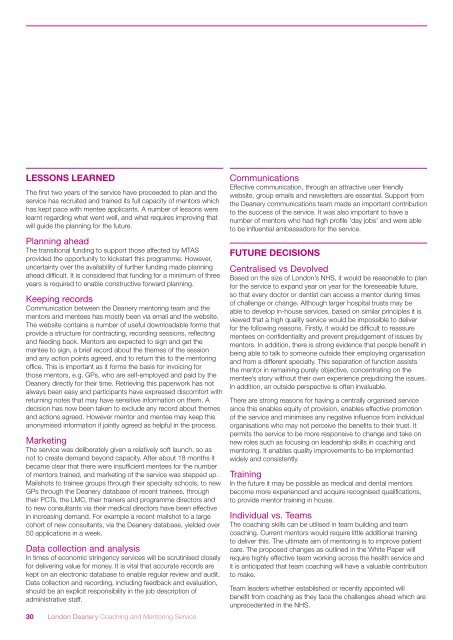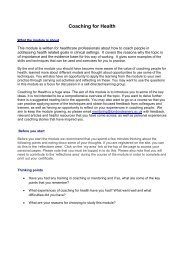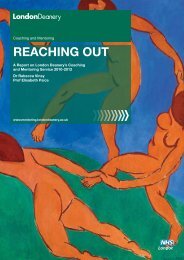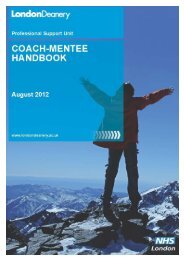The First 500 - A report on London Deanery's Coaching ... - Mentoring
The First 500 - A report on London Deanery's Coaching ... - Mentoring
The First 500 - A report on London Deanery's Coaching ... - Mentoring
Create successful ePaper yourself
Turn your PDF publications into a flip-book with our unique Google optimized e-Paper software.
Less<strong>on</strong>s learned<str<strong>on</strong>g>The</str<strong>on</strong>g> first two years of the service have proceeded to plan and theservice has recruited and trained its full capacity of mentors whichhas kept pace with mentee applicants. A number of less<strong>on</strong>s werelearnt regarding what went well, and what requires improving thatwill guide the planning for the future.Planning ahead<str<strong>on</strong>g>The</str<strong>on</strong>g> transiti<strong>on</strong>al funding to support those affected by MTASprovided the opportunity to kickstart this programme. However,uncertainty over the availability of further funding made planningahead difficult. It is c<strong>on</strong>sidered that funding for a minimum of threeyears is required to enable c<strong>on</strong>structive forward planning.Keeping recordsCommunicati<strong>on</strong> between the Deanery mentoring team and thementors and mentees has mostly been via email and the website.<str<strong>on</strong>g>The</str<strong>on</strong>g> website c<strong>on</strong>tains a number of useful downloadable forms thatprovide a structure for c<strong>on</strong>tracting, recording sessi<strong>on</strong>s, reflectingand feeding back. Mentors are expected to sign and get thementee to sign, a brief record about the themes of the sessi<strong>on</strong>and any acti<strong>on</strong> points agreed, and to return this to the mentoringoffice. This is important as it forms the basis for invoicing forthose mentors, e.g. GPs, who are self-employed and paid by theDeanery directly for their time. Retrieving this paperwork has notalways been easy and participants have expressed discomfort withreturning notes that may have sensitive informati<strong>on</strong> <strong>on</strong> them. Adecisi<strong>on</strong> has now been taken to exclude any record about themesand acti<strong>on</strong>s agreed. However mentor and mentee may keep thisan<strong>on</strong>ymised informati<strong>on</strong> if jointly agreed as helpful in the process.Marketing<str<strong>on</strong>g>The</str<strong>on</strong>g> service was deliberately given a relatively soft launch, so asnot to create demand bey<strong>on</strong>d capacity. After about 18 m<strong>on</strong>ths itbecame clear that there were insufficient mentees for the numberof mentors trained, and marketing of the service was stepped up.Mailshots to trainee groups through their specialty schools, to newGPs through the Deanery database of recent trainees, throughtheir PCTs, the LMC, their trainers and programme directors andto new c<strong>on</strong>sultants via their medical directors have been effectivein increasing demand. For example a recent mailshot to a largecohort of new c<strong>on</strong>sultants, via the Deanery database, yielded over50 applicati<strong>on</strong>s in a week.Data collecti<strong>on</strong> and analysisIn times of ec<strong>on</strong>omic stringency services will be scrutinised closelyfor delivering value for m<strong>on</strong>ey. It is vital that accurate records arekept <strong>on</strong> an electr<strong>on</strong>ic database to enable regular review and audit.Data collecti<strong>on</strong> and recording, including feedback and evaluati<strong>on</strong>,should be an explicit resp<strong>on</strong>sibility in the job descripti<strong>on</strong> ofadministrative staff.30L<strong>on</strong>d<strong>on</strong> Deanery <strong>Coaching</strong> and <strong>Mentoring</strong> ServiceCommunicati<strong>on</strong>sEffective communicati<strong>on</strong>, through an attractive user friendlywebsite, group emails and newsletters are essential. Support fromthe Deanery communicati<strong>on</strong>s team made an important c<strong>on</strong>tributi<strong>on</strong>to the success of the service. It was also important to have anumber of mentors who had high profile ‘day jobs’ and were ableto be influential ambassadors for the service.Future decisi<strong>on</strong>sCentralised vs DevolvedBased <strong>on</strong> the size of L<strong>on</strong>d<strong>on</strong>’s NHS, it would be reas<strong>on</strong>able to planfor the service to expand year <strong>on</strong> year for the foreseeable future,so that every doctor or dentist can access a mentor during timesof challenge or change. Although larger hospital trusts may beable to develop in-house services, based <strong>on</strong> similar principles it isviewed that a high quality service would be impossible to deliverfor the following reas<strong>on</strong>s. <str<strong>on</strong>g>First</str<strong>on</strong>g>ly, it would be difficult to reassurementees <strong>on</strong> c<strong>on</strong>fidentiality and prevent prejudgement of issues bymentors. In additi<strong>on</strong>, there is str<strong>on</strong>g evidence that people benefit inbeing able to talk to some<strong>on</strong>e outside their employing organisati<strong>on</strong>and from a different specialty. This separati<strong>on</strong> of functi<strong>on</strong> assiststhe mentor in remaining purely objective, c<strong>on</strong>centrating <strong>on</strong> thementee’s story without their own experience prejudicing the issues.In additi<strong>on</strong>, an outside perspective is often invaluable.<str<strong>on</strong>g>The</str<strong>on</strong>g>re are str<strong>on</strong>g reas<strong>on</strong>s for having a centrally organised servicesince this enables equity of provisi<strong>on</strong>, enables effective promoti<strong>on</strong>of the service and minimises any negative influence from individualorganisati<strong>on</strong>s who may not perceive the benefits to their trust. Itpermits the service to be more resp<strong>on</strong>sive to change and take <strong>on</strong>new roles such as focusing <strong>on</strong> leadership skills in coaching andmentoring. It enables quality improvements to be implementedwidely and c<strong>on</strong>sistently.TrainingIn the future it may be possible as medical and dental mentorsbecome more experienced and acquire recognised qualificati<strong>on</strong>s,to provide mentor training in house.Individual vs. Teams<str<strong>on</strong>g>The</str<strong>on</strong>g> coaching skills can be utilised in team building and teamcoaching. Current mentors would require little additi<strong>on</strong>al trainingto deliver this. <str<strong>on</strong>g>The</str<strong>on</strong>g> ultimate aim of mentoring is to improve patientcare. <str<strong>on</strong>g>The</str<strong>on</strong>g> proposed changes as outlined in the White Paper willrequire highly effective team working across the health service andit is anticipated that team coaching will have a valuable c<strong>on</strong>tributi<strong>on</strong>to make.Team leaders whether established or recently appointed willbenefit from coaching as they face the challenges ahead which areunprecedented in the NHS.






